A Quote by Stuart Franklin
Social media's currency is the single photograph. Whereas, every time I look at a photograph, I look at twenty or thirty photographs. I'm looking for a narrative. And that's a different kind of construct. If you're a poet and you put a line from your poem online, "The trees bending over gracefully," or something, you can get a tick. But that has nothing to do with your longer poem.
Related Quotes
Poetry is like a portrait of a moment or person, and the poem is almost like looking at a photograph; it slaps you in the face and kisses you at the same time. Nothing else does that, with that brevity. Songs try to do it, but that's three minutes. A poem, you read it and it kind of changes your life and you don't know how it happened and you can never forget it. It's like the best song lyric, the best line from a film-everything in the world that's short and great put together.
It was early on in 1965 when I wrote some of my first poems. I sent a poem to 'Harper's' magazine because they paid a dollar a line. I had an eighteen-line poem, and just as I was putting it into the envelope, I stopped and decided to make it a thirty-six-line poem. It seemed like the poem came back the next day: no letter, nothing.
How foolish of me to believe that it would be that easy. I had confused the appearance of trees and automobiles, and people with a reality itself, and believed that a photograph of these appearances to be a photograph of it. It is a melancholy truth that I will never be able to photograph it and can only fail. I am a reflection photographing other reflections within a reflection. To photograph reality is to photograph nothing.
I think I’ve said this before many times—that photography allows you to learn to look and see. You begin to see things you had never paid any attention to. And as you photograph, one of the benefits is that the world becomes a much richer, juicier, visual place. Sometimes it is almost unbearable — it is too interesting. And it isn’t always just the photos you take that matters. It is looking at the world and seeing things that you never photograph that could be photographs if you had the energy to keep taking pictures every second of your life.
It's difficult to put your own bare ass out on the limb every time you sit down to write a poem. But that's really sort of the ideal. Because if we don't discover something about ourselves and our world in the making of a poem, chances are it's not going to be a very good poem. So what I'm saying is that a lot of our best poets could be better poets if they wrote less and risked more in what they do.
If you look at a photograph, and you think, 'My isn't that a beautiful photograph,' and you go on to the next one, or 'Isn't that nice light?' so what? I mean what does it do to you or what's the real value in the long run? What do you walk away from it with? I mean, I'd much rather show you a photograph that makes demands on you, that you might become involved in on your own terms or be perplexed by.
The model is just one element of the photograph. There's also the location, the light - all that junk. It helps if the girl is really good-looking, but a girl can be not super good-looking and it'd still be a really good photograph. I ask people to send some photos of where they live if that's where I'm shooting. I go for shabby places over too-nice places, because most of these girls are going to look better if they're not made to look rich.
One of the magical things about photography is the transformation that takes place when you photograph something. Something that inherently has very little going for it in terms of the interest you take in it, can become infinitely more interesting when rendered as a photograph. It's no longer a building. It's a photograph.
A photograph never grows old. You and I change, people change all through the months and years but a photograph always remains the same. How nice to look at a photograph of mother or father taken many years ago. You see them as you remember them. But as people live on, they change completely. That is why I think a photograph can be kind.


































